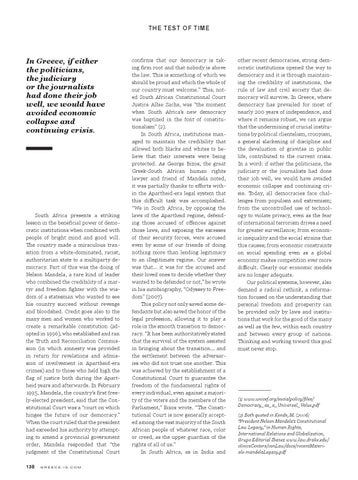THE TE S T OF TIME
In Greece, if either the politicians, the judiciary or the journalists had done their job well, we would have avoided economic collapse and continuing crisis.
South Africa presents a striking lesson in the beneficial power of democratic institutions when combined with people of bright mind and good will. The country made a miraculous transition from a white-dominated, racist, authoritarian state to a multiparty democracy. Part of this was the doing of Nelson Mandela, a rare kind of leader who combined the credibility of a martyr and freedom fighter with the wisdom of a statesman who wanted to see his country succeed without revenge and bloodshed. Credit goes also to the many men and women who worked to create a remarkable constitution (adopted in 1996), who established and ran the Truth and Reconciliation Commission (in which amnesty was provided in return for revelations and admission of involvement in Apartheid-era crimes) and to those who held high the flag of justice both during the Apartheid years and afterwards. In February 1995, Mandela, the country’s first freely-elected president, said that the Constitutional Court was a “court on which hinges the future of our democracy.” When the court ruled that the president had exceeded his authority by attempting to amend a provincial government order, Mandela responded that “the judgment of the Constitutional Court 138
GREECE-is.com
confirms that our democracy is taking firm root and that nobody is above the law. This is something of which we should be proud and which the whole of our country must welcome.” This, noted South African Constitutional Court Justice Albie Sachs, was “the moment when South Africa’s new democracy was baptized in the font of constitutionalism” (2). In South Africa, institutions managed to maintain the credibility that allowed both blacks and whites to believe that their interests were being protected. As George Bizos, the great Greek-South African human rights lawyer and friend of Mandela noted, it was partially thanks to efforts within the Apartheid-era legal system that this difficult task was accomplished. “We in South Africa, by opposing the laws of the Apartheid regime, defending those accused of offences against those laws, and exposing the excesses of their security forces, were accused even by some of our friends of doing nothing more than lending legitimacy to an illegitimate regime. Our answer was that... it was for the accused and their loved ones to decide whether they wanted to be defended or not,” he wrote in his autobiography, “Odyssey to Freedom” (2007). This policy not only saved some defendants but also saved the honor of the legal profession, allowing it to play a role in the smooth transition to democracy. “It has been authoritatively stated that the survival of the system assisted in bringing about the transition... and the settlement between the adversaries who did not trust one another. This was achieved by the establishment of a Constitutional Court to guarantee the freedom of the fundamental rights of every individual, even against a majority of the voters and the members of the Parliament,” Bizos wrote. “The Constitutional Court is now generally accepted among the vast majority of the South African people of whatever race, color or creed, as the upper guardian of the rights of all of us.” In South Africa, as in India and
other recent democracies, strong democratic institutions opened the way to democracy and it is through maintaining the credibility of institutions, the rule of law and civil society that democracy will survive. In Greece, where democracy has prevailed for most of nearly 200 years of independence, and where it remains robust, we can argue that the undermining of crucial institutions by political clientelism, cronyism, a general slackening of discipline and the devaluation of gravitas in public life, contributed to the current crisis. In a word: if either the politicians, the judiciary or the journalists had done their job well, we would have avoided economic collapse and continuing crisis. Today, all democracies face challenges from populism and extremism; from the uncontrolled use of technology to violate privacy, even as the fear of international terrorism drives a need for greater surveillance; from economic inequality and the social strains that this causes; from economic constraints on social spending even as a global economy makes competition ever more difficult. Clearly our economic models are no longer adequate. Our political systems, however, also demand a radical rethink, a reformation focused on the understanding that personal freedom and prosperity can be provided only by laws and institutions that work for the good of the many as well as the few, within each country and between every group of nations. Thinking and working toward this goal must never stop.
(1) www.unicef.org/socialpolicy/files/ Democracy_as_a_Universal_Value.pdf (2) Both quoted in Kende, M. (2006) “President Nelson Mandela’s Constitutional Law Legacy,” in Human Rights, International Relations and Globalization, Grupo Editorial Ibanez www.law.drake.edu/ clinicsCenters/conLaw/docs/recentMaterials-mandelaLegacy.pdf
